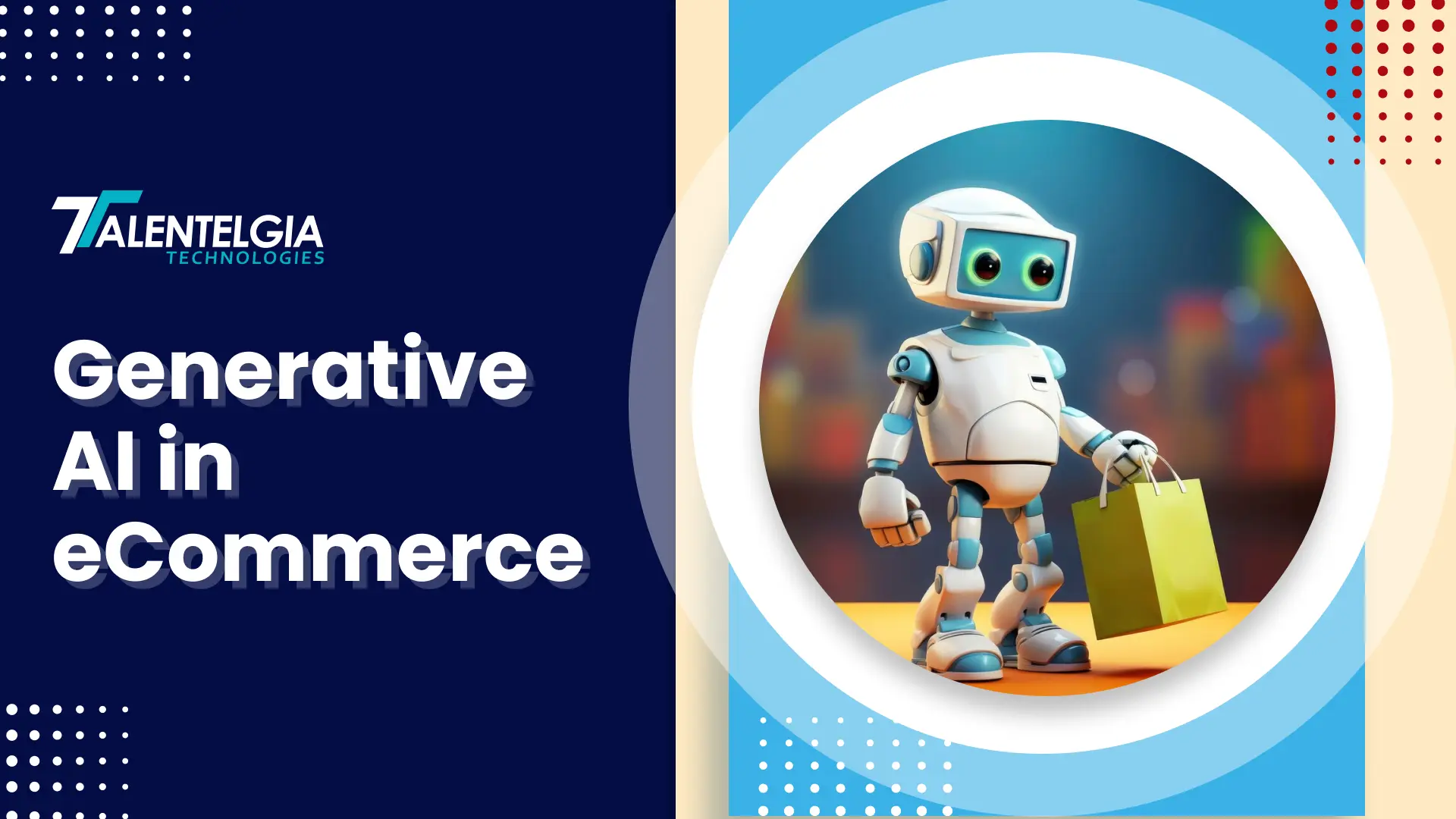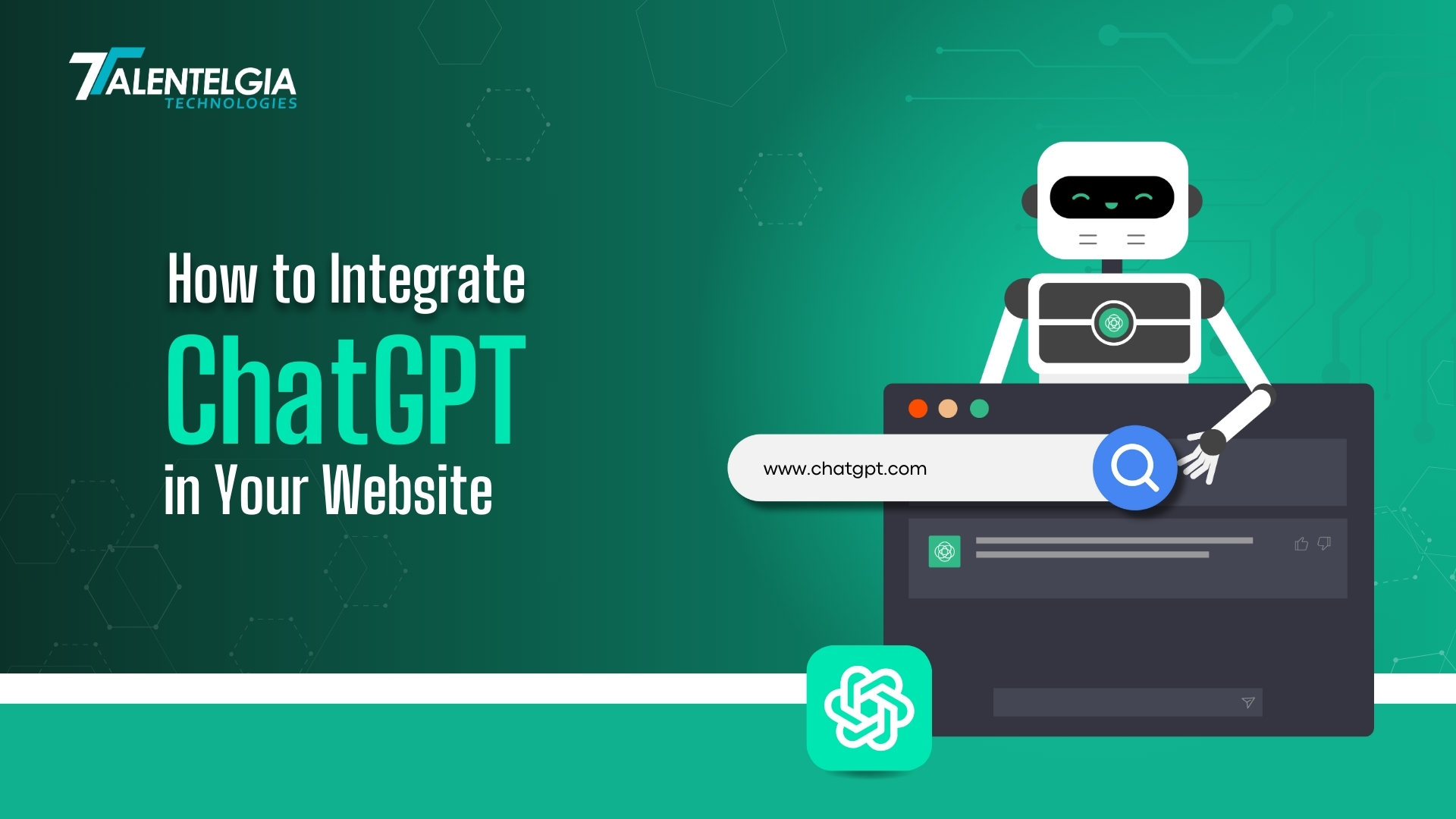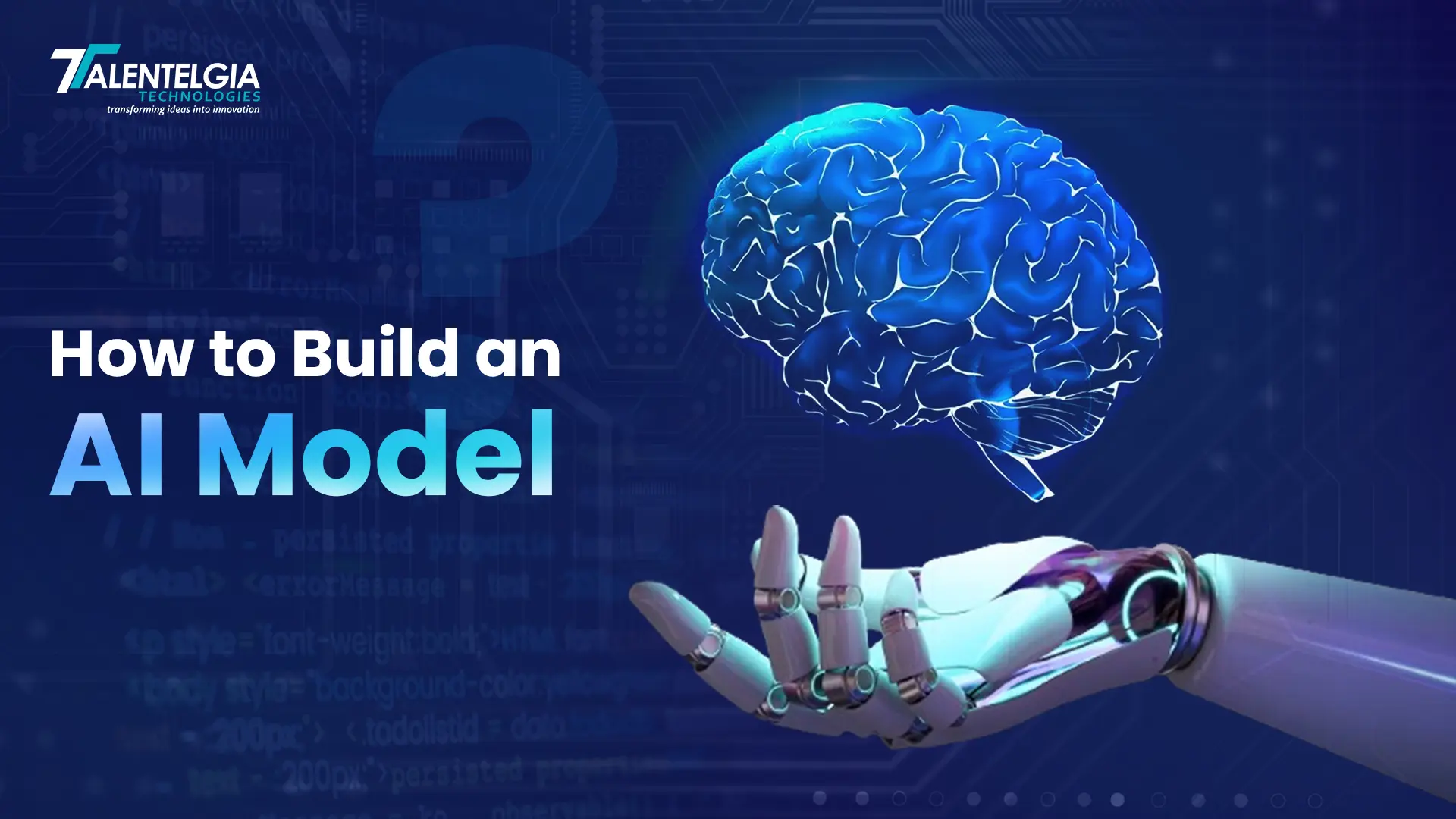Standing out in the intense competition of e-commerce is not easy anymore. The industry and user needs are changing so the businesses must change to thrive.
Generative Artificial Intelligence (GenAI) in e-commerce has become an essential tool for effective operations and an in-depth understanding of customer behavior. GenAI stands out as a transformative ally, offering unique capabilities in content creation and problem-solving. By using the power of GenAI, e-commerce app development companies can create unique experiences that resonate with their target audience, increase engagement and loyalty, and ultimately outperform their competitors.
with Expert AI
Development Services Contact Talentelgia for cutting-edge AI
solutions trusted by our clients in
over 20+ countries .

How can companies use GenAI to increase productivity and reinvent the customer experience by using generative AI e-commerce? Let us find out in the blog below!
Generative AI Applications in E-commerce
As e-commerce continues to evolve, using artificial intelligence in creating product descriptions is not the only challenge but a necessity to get better. By leveraging the power of generative AI in e-commerce to deliver detailed, personalized services at scale, businesses can create connections with customers, drive change, and increase efficiency. This is where AI integration services come into play to help you use the power of AI to unlock effective online marketing opportunities for your target audience.
Product Descriptions
One of the most revolutionary Generative AI in e-commerce is creating product descriptions. This is especially useful for businesses that deal with large or specialized products. While AI-driven product recommendations have long been a key element of online shopping, the integration of generative AI adds a layer of complexity that complicates the entire process. With generative AI, businesses can achieve clearer, more personalized goals, facilitating the rapid creation of experiences and content curation. In addition, artificial intelligence can create product descriptions that suit each customer’s preferences and pain points.
Personalization
The goal of the best AI platforms is that they can meet personalized needs without having to build separate models for each customer. The beauty is that it is interconnected with smart algorithms that constantly improve themselves based on user input. As a result, AI-driven recommendations and personalization improve over time, translating into higher conversion rates and greater customer satisfaction.
Intuitive Experience
In traditional brick-and-mortar stores, sales and service staff are valuable; They improve the product by intuitively directing customers to the product that suits their interests. With the emergence of artificial intelligence, this identity now turns into online shopping. Although chatbots have long been an important part of the e-commerce space, their chats lack the depth needed to support customer interactions.
However, with the emergence of smart concierge services, online commerce has changed. These digital assistants can interpret surveys and image-based instructions, create customized responses, and perform data-driven interactions that provide lasting impressions.
Product Discovery
Research shows that the majority (82%) of businesses using AI for business are making progress in this area. Consider this scenario: A customer is trying to copy the latest outfits worn by her favorite people. Instead of aimlessly browsing through endless product lists, they can upload photos of iconic fashionistas and leverage their AI skills to recommend similar products. This innovation not only simplifies the purchasing process but also builds deeper relationships with customers, paving the way for trust and customer retention. With the intelligence of the hat, shopping turns into an easy and fun journey where every interaction is personal and enjoyable.
Chatbots
Retention of customers is one of the major problems for the e-commerce business. Customers now have numerous choices. Therefore, it is easy for them to switch to a different place if they feel there is no value in the deal. AI goes through the process of helping enterprises discern their customers’ behavior and needs. Companies can use this information to develop customized experiences that will keep the customers coming back.
Selling on various websites is a challenge. Keeping Tabs on many important things like inventory, orders, and customer issues, is one of the most common challenges of running such a business. However, these needs will be addressed with much less difficulty. When you use generative AI in e-commerce, AI tools maintain inventory across all channels and configure the sales process so that everything runs as smoothly as possible.
Also Read: Why Your Business Needs a Customizable Chatbot
Expert Generative
AI Development. Cutting-edge generative AI solutions
devilerd by top AI developers, trusted
in 20+ countries.

Post Purchase Operations
Additionally, road leaders can use technology to improve delivery methods, reduce carbon emissions, and impact the environment. By optimizing delivery methods based on factors such as vehicle models, delivery intervals, and fuel consumption, companies can not only reduce carbon emissions but also reduce vehicle shipping costs.
Effective and efficient delivery and delivery strategy. From identifying the best warehouse locations to optimizing inventory, AI-driven analytics enables businesses to optimize inventory and improve performance.
For businesses in an environment where shipping costs, security issues, and poor order quality are paramount, the integration of generative AI in e-commerce for after-sales business is a valid solution.
Let’s explore how Generative AI is transforming e-commerce through this video. Discover how AI personalized shopping experiences, creates dynamic content, enhances customer service, optimizes inventory management, and improves security.
Role of Generative AI in E-commerce
As consumer preferences change and competition is increasing, the role of artificial -commerce. This provides new solutions to challenges and lays new foundations for intelligence is changing. Generative AI in e-commerce, powered by advanced algorithms, is revolutionizing all aspects of growth and success.
Natural Language Processing: Generative artificial intelligence understands natural language, processes large amounts of data, and produces human-like responses. This results in more user-friendly and interactive solutions. Artificial intelligence tools are reshaping the e-commerce landscape by improving recommendations to optimize post-purchase, allowing businesses to provide solutions to customers’ changing needs and preferences.
Website Performance and Usability: Your website site should be designed in such a way that it is easy to use, to avoid customers terminating the transaction. Generative AI generates the best websites if the AI is used to track how people use them. By making your website user-friendly, businesses not only attract users but also convert them to loyal customers.
Mobile Optimization: More and more people tend to use their smartphones for shopping. So the website has to be designed to perform well on mobile devices. Generative AI can handle this challenge by building web pages that work more effectively on mobile phones and tablets. This makes it possible for a buyer to shop from any device conveniently.
Data Security and Privacy: The safety of customer data is an important part of the sales process, especially as there are so many threats these days. Generative AI can often detect data security flaws and fix them in their earliest stages to minimize the damage. This makes it easier to maintain the confidentiality of customer data and fosters trust.
Generative AI E-commerce – Live Case Studies
Generative AI in e-commerce is a powerful tool that uses advanced algorithms to analyze data, understand user behavior, and create personalized recommendations.
From real-world examples, we explore how the new brand is leveraging the potential of generative AI to revolutionize all aspects of e-commerce. From personalized recommendations to virtual reality experiences, augmented reality makeup simulations, interior design, and product development, generative AI is driving innovation and redefining spending by engaging people in digital marketing.
Join us as we explore this exciting case study showing how generative AI is shaping the future of e-commerce and paving the way for improvements such as customer satisfaction, increased brand loyalty, and sustainable growth.
1. Farfetch: Personalized Product Recommendations
This luxury fashion e-commerce platform uses artificial intelligence to provide personalized recommendations to its customers. Farfetch analyzes lots of customer data, including search history, shopping habits, and preferences, through a complex process. The AI system understands each customer’s unique preferences and preferences, creating recommendations that show which products are most likely to be returned based on individual preferences. Additionally, Farfetch continues to improve its recommendation engine based on real-time interactions, ensuring recommendations remain relevant and engaging. This personalized approach not only improves business performance but also builds customer loyalty and increases conversions because users are understood and cared for on a personal level.
2. The North Face: Virtual Try-On Experience
An outdoor clothing store, this brand uses artificial intelligence to create a virtual try-on experience for its customers. Its new “Artificial Intelligence Personal Shopper” feature, lets users can see how clothes and accessories will look on them before purchasing. T
The North Face’s artificial intelligence system uses advanced computer vision algorithms to match clothing to the wearer’s body, ensuring accurate fit and style. This interactive shopping experience not only gives customers confidence in their purchasing decisions but also reduces the likelihood of returns as users gain a better understanding of how things work. Additionally, The North Face continues to develop its intellectual capacity to provide feedback and improve accuracy, facilitate coordination, and engage in virtual experiments for users.
3. Sephora: Augmented Reality Makeup Simulation
This leading cosmetics and beauty retailer Sephora is using artificial intelligence to change how consumers try makeup. Their new tool “Sephora Virtual Artist”, lets users try different makeup products using their smartphone’s camera or photos.
Their generative AI algorithms simulate various cosmetic products so that users can try them before purchasing. Sephora’s AI system recommends makeup products by analyzing skin tone, texture, and face shape.
This immersive AR experience allows users to discover new makeup and products. It also instills confidence in purchasing decisions, resulting in increased sales and customer satisfaction.
4. IKEA: Interior Design Visualization
IKEA, the world leader in furniture and home furnishings, has integrated artificial intelligence into the “IKEA Places” application to enable the development of interior visual work. Users can preview IKEA furniture and decorations in their settings before purchasing. AI systems measure virtual objects and place them in the customer’s environment, allowing them to see what the object will look like and how it will fit into their home. This helps users make informed decisions. By allowing users to “try before you buy,” IKEA increases customer satisfaction and reduces the likelihood of returns, ultimately increasing sales and loyalty.
5. Nike: Product Personalization and Design
Nike is a global leader in sports and footwear and uses its design expertise to deliver customized products. It lets customers personalize their shoes by choosing from a variety of designs, colors, and materials. Generative Artificial Intelligence algorithms create millions of designs according to customer preferences. This ensures that each product fits the user’s taste and style. This innovative, innovative design not only encourages users to express their creativity. It enables Nike to strengthen its leading position in the sportswear industry by increasing customer engagement, loyalty, and feedback by offering personalized products.
Frequently Asked Questions
1. How is Generative AI in e-commerce useful?
Generative AI analyzes lots of data to customize content and offers based on personal preferences and behavior. This allows businesses to offer their customers a personalized marketing experience that increases engagement and conversion rates.
2. What should companies consider when integrating artificial intelligence into web design?
When integrating AI into web design, companies need to consider important factors such as user experience, privacy, and common conflict. It is important to ensure that AI-powered features improve the overall web experience while maintaining user trust and privacy.
3. What impact does generative AI have on consumer trust in e-commerce?
Generative AI increases customer trust in e-commerce by delivering personalized experiences that meet individual needs and preferences. Using AI-driven recommendations and interactions, businesses can build connections with customers and build trust and confidence over time.
4. How can generative AI predict and adapt to customer preferences?
Yes, generative AI can predict and adapt to customer preferences by identifying patterns and patterns in big data. Through continuous learning and optimization, smart algorithms can predict changing customer needs and make recommendations accordingly, making them more efficient and effective.
5. How will generative artificial intelligence affect customer trust and reputation in e-commerce?
Generative AI impacts customer trust and reputation in e-commerce by delivering personalized interactions and experiences that are relevant to customers. By providing advice and solutions, companies can increase customer satisfaction and trust, ultimately increasing reputation and trust in the eyes of users.
Experience the power of AI solutions with the latest technologies. Transform your operations & boost efficiency today with these AI ideas for businesses!
Conclusion
Generative AI development services have made an impact in e-commerce, giving benefits that push toward better customer experience and a boost in sales. AI innovations range from personalized recommendations, and virtual try-on experiences right to chatbot-powered customer relationships, it is doing so for digital marketing.
Artificial intelligence is reshaping the way businesses run in the digital world with the aid of productive artificial intelligence.
A responsible application of artificial intelligence technology should be a gift for e-commerce companies as they are ready to stay in front of the competitive ones and establish synergy with their potential customers. Through the help of innovative technologies organizations can discover new directions of business development and make the environment of digital distribution more beneficial.
We believe that this will assist you in making a sound choice for your e-commerce company. By employing a thoughtful tactical approach, generative AI can lead to the revolution of e-commerce, bring innovation, and create unprecedented value for businesses and consumers.


 Healthcare App Development Services
Healthcare App Development Services
 Real Estate Web Development Services
Real Estate Web Development Services
 E-Commerce App Development Services
E-Commerce App Development Services E-Commerce Web Development Services
E-Commerce Web Development Services Blockchain E-commerce Development Company
Blockchain E-commerce Development Company
 Fintech App Development Services
Fintech App Development Services Fintech Web Development
Fintech Web Development Blockchain Fintech Development Company
Blockchain Fintech Development Company
 E-Learning App Development Services
E-Learning App Development Services
 Restaurant App Development Company
Restaurant App Development Company
 Mobile Game Development Company
Mobile Game Development Company
 Travel App Development Company
Travel App Development Company
 Automotive Web Design
Automotive Web Design
 AI Traffic Management System
AI Traffic Management System
 AI Inventory Management Software
AI Inventory Management Software
 AI Software Development
AI Software Development  AI Development Company
AI Development Company  AI App Development Services
AI App Development Services  ChatGPT integration services
ChatGPT integration services  AI Integration Services
AI Integration Services  Generative AI Development Services
Generative AI Development Services  Natural Language Processing Company
Natural Language Processing Company Machine Learning Development
Machine Learning Development  Machine learning consulting services
Machine learning consulting services  Blockchain Development
Blockchain Development  Blockchain Software Development
Blockchain Software Development  Smart Contract Development Company
Smart Contract Development Company  NFT Marketplace Development Services
NFT Marketplace Development Services  Asset Tokenization Company
Asset Tokenization Company DeFi Wallet Development Company
DeFi Wallet Development Company Mobile App Development
Mobile App Development  IOS App Development
IOS App Development  Android App Development
Android App Development  Cross-Platform App Development
Cross-Platform App Development  Augmented Reality (AR) App Development
Augmented Reality (AR) App Development  Virtual Reality (VR) App Development
Virtual Reality (VR) App Development  Web App Development
Web App Development  SaaS App Development
SaaS App Development Flutter
Flutter  React Native
React Native  Swift (IOS)
Swift (IOS)  Kotlin (Android)
Kotlin (Android)  Mean Stack Development
Mean Stack Development  AngularJS Development
AngularJS Development  MongoDB Development
MongoDB Development  Nodejs Development
Nodejs Development  Database Development
Database Development Ruby on Rails Development
Ruby on Rails Development Expressjs Development
Expressjs Development  Full Stack Development
Full Stack Development  Web Development Services
Web Development Services  Laravel Development
Laravel Development  LAMP Development
LAMP Development  Custom PHP Development
Custom PHP Development  .Net Development
.Net Development  User Experience Design Services
User Experience Design Services  User Interface Design Services
User Interface Design Services  Automated Testing
Automated Testing  Manual Testing
Manual Testing  Digital Marketing Services
Digital Marketing Services 
 Ride-Sharing And Taxi Services
Ride-Sharing And Taxi Services Food Delivery Services
Food Delivery Services Grocery Delivery Services
Grocery Delivery Services Transportation And Logistics
Transportation And Logistics Car Wash App
Car Wash App Home Services App
Home Services App ERP Development Services
ERP Development Services CMS Development Services
CMS Development Services LMS Development
LMS Development CRM Development
CRM Development DevOps Development Services
DevOps Development Services AI Business Solutions
AI Business Solutions AI Cloud Solutions
AI Cloud Solutions AI Chatbot Development
AI Chatbot Development API Development
API Development Blockchain Product Development
Blockchain Product Development Cryptocurrency Wallet Development
Cryptocurrency Wallet Development About Talentelgia
About Talentelgia  Our Team
Our Team  Our Culture
Our Culture 
 Healthcare App Development Services
Healthcare App Development Services Real Estate Web Development Services
Real Estate Web Development Services E-Commerce App Development Services
E-Commerce App Development Services E-Commerce Web Development Services
E-Commerce Web Development Services Blockchain E-commerce
Development Company
Blockchain E-commerce
Development Company Fintech App Development Services
Fintech App Development Services Finance Web Development
Finance Web Development Blockchain Fintech
Development Company
Blockchain Fintech
Development Company E-Learning App Development Services
E-Learning App Development Services Restaurant App Development Company
Restaurant App Development Company Mobile Game Development Company
Mobile Game Development Company Travel App Development Company
Travel App Development Company Automotive Web Design
Automotive Web Design AI Traffic Management System
AI Traffic Management System AI Inventory Management Software
AI Inventory Management Software AI Software Development
AI Software Development AI Development Company
AI Development Company ChatGPT integration services
ChatGPT integration services AI Integration Services
AI Integration Services Machine Learning Development
Machine Learning Development Machine learning consulting services
Machine learning consulting services Blockchain Development
Blockchain Development Blockchain Software Development
Blockchain Software Development Smart contract development company
Smart contract development company NFT marketplace development services
NFT marketplace development services IOS App Development
IOS App Development Android App Development
Android App Development Cross-Platform App Development
Cross-Platform App Development Augmented Reality (AR) App
Development
Augmented Reality (AR) App
Development Virtual Reality (VR) App Development
Virtual Reality (VR) App Development Web App Development
Web App Development Flutter
Flutter React
Native
React
Native Swift
(IOS)
Swift
(IOS) Kotlin (Android)
Kotlin (Android) MEAN Stack Development
MEAN Stack Development AngularJS Development
AngularJS Development MongoDB Development
MongoDB Development Nodejs Development
Nodejs Development Database development services
Database development services Ruby on Rails Development services
Ruby on Rails Development services Expressjs Development
Expressjs Development Full Stack Development
Full Stack Development Web Development Services
Web Development Services Laravel Development
Laravel Development LAMP
Development
LAMP
Development Custom PHP Development
Custom PHP Development User Experience Design Services
User Experience Design Services User Interface Design Services
User Interface Design Services Automated Testing
Automated Testing Manual
Testing
Manual
Testing About Talentelgia
About Talentelgia Our Team
Our Team Our Culture
Our Culture

















 Write us on:
Write us on:  Business queries:
Business queries:  HR:
HR: 




